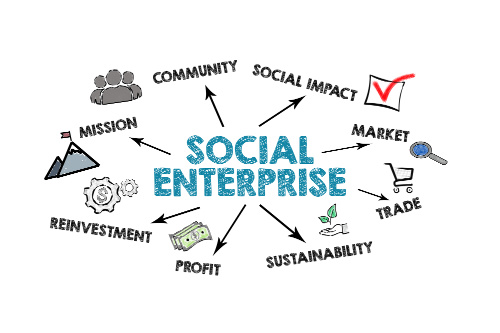In today’s world, where social issues like poverty, inequality, and environmental degradation are increasingly prominent, social enterprise is gaining traction. But what exactly is a social enterprise, and how does it work? Let’s dive in!

Definition
A social enterprise is a business model that prioritizes social good alongside financial success. While traditional businesses aim primarily for profit, social enterprises strive to address social, cultural, or environmental challenges. They operate under the belief that they can effectively change society while still being self-sustaining financially.
For Example, RainbowBiz CIC trades through the shop on Shotton High Street in North Wales. The Shop profit is returned to the community via our Social projects. The projects are primarily to support the most marginalised members of the community. People with physical impairments, mental health issues and learning difficulties attend the group to help combat isolation amongst this demographic.

Characteristics of Social Enterprises
1. **Social Mission**: At the heart of a social enterprise is a clear social mission. This could be anything from improving education, providing job training for marginalized groups, or promoting sustainable practices.
2. **Revenue-Generating**: Unlike charities that rely solely on donations and grants, social enterprises generate their own revenue through sales of products or services. This self-sufficiency allows them to reinvest in their mission and grow their impact.
3. **Reinvestment of Profits**: Profits made by social enterprises are typically reinvested into the organization to further their social mission, rather than being distributed to shareholders.
4. **Innovation**: Many social enterprises leverage innovative solutions to address societal problems, often implementing fresh ideas or technologies to maximize their impact.
5. **Measurable Impact**: Social enterprises often aim to measure and report the social value they create, employing metrics that assess their contributions to society and the environment.
#### Examples of Social Enterprises
– **TOMS Shoes**: Known for its “One for One” model, TOMS donates a pair of shoes to a child in need for every pair sold, aiming to improve children’s health and education through better footwear.
– **Warby Parker**: This eyewear company not only sells stylish glasses at affordable prices but also follows a similar model where for every pair sold, a pair is distributed to someone in need.
– **The Big Issue**: A magazine sold by homeless individuals, The Big Issue helps them earn a living while raising awareness about homelessness and providing support resources.
-**RainbowBiz CIC**: A community shop selling gifts, including mystical, gothic, spiritual, musical, and garden items. The shop is run by staff and volunteers, with profits paying for the community projects RainbowBiz CIC runs.
#### Advantages of Social Enterprises
– **Addressing Social Problems**: By combining business principles with social goals, social enterprises like RainbowBiz CIC can provide viable solutions to pressing social issues. RainbowBiz CIC sits on local panels such as the North Wales Police Diversity and Inclusion Panel, and ITV North Wales Diversity and Inclusion Panel offering opinions to shape society for the better.
– **Sustainable Impact**: Their self-sustaining revenue model ensures continued support for their social missions, making them resilient to fluctuating donations or grants. RainbowBiz CIC has been supported by many local and national funders such as The National Lottery, Steve Morgan Foundation, FLVC, Office of the Police Crime Commissioner for North Wales, Police and Community Trust, Blakemore Foundation and many more.
– **Community Empowerment**: Many social enterprises focus on empowering local communities, creating jobs, and fostering an inclusive economy. Volunteers at RainbowBiz CIC are usually, Neurodivergent or living with long-term health conditions meaning they are unable to sustain everyday employment. RainbowBiz CIC will adapt volunteering roles wherever possible, so if you have a health condition or disability, you can still get involved. We will provide additional equipment to assist volunteers in their roles or offer flexible working hours to suit the volunteer, helping them undertake relevant training.
Challenges Faced
– **Balancing Act**: Social enterprises often struggle to balance their social and financial missions. Maintaining profitability while staying true to their social goals can be challenging.
– **Access to Funding**: While there is growing support for social enterprises, they may still face difficulty securing funding compared to traditional businesses.
– **Awareness and Understanding**: Many people are still unfamiliar with the social enterprise model, which can hinder support and collaboration.
Conclusion
Social enterprises represent an innovative and impactful way to tackle some of society’s most pressing challenges. By blending business acumen with a dedication to making a difference, they carve out a unique niche in the economy. As awareness of social issues continues to grow, so too does the potential for social enterprises to create lasting change. Whether you’re a consumer, an entrepreneur, or simply someone interested in social change, supporting social enterprises can contribute to building a better, more equitable world.
